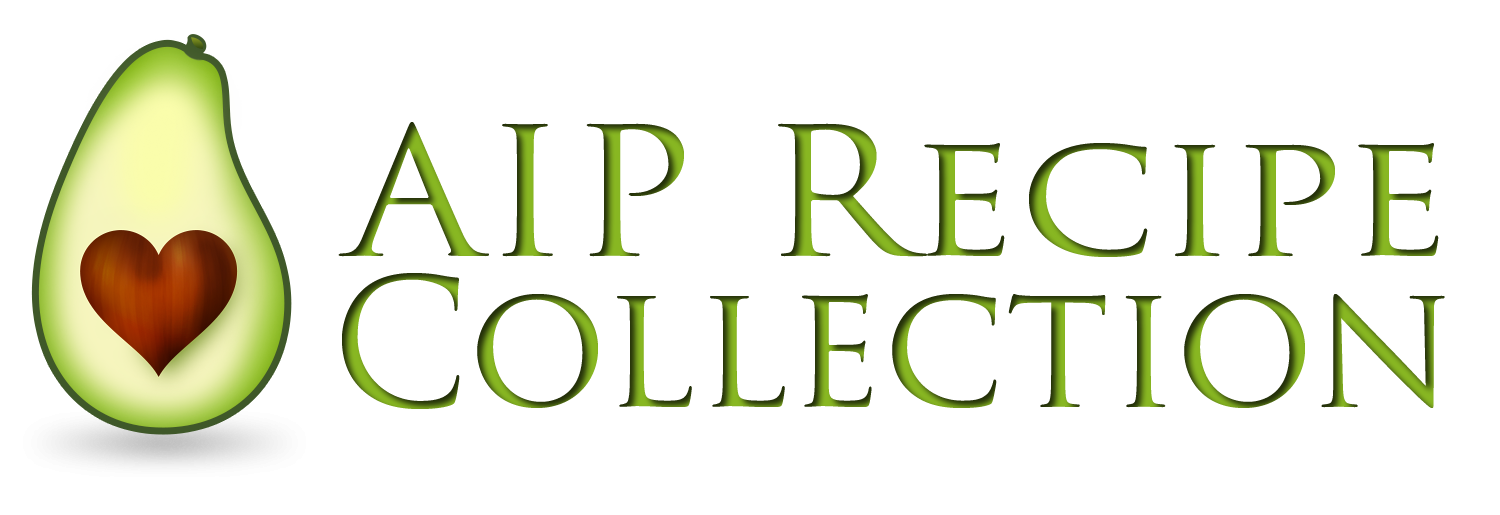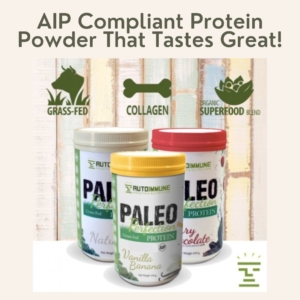This post contains affiliate links. Click here to see what that means.
Gelatin vs. Collagen – what’s the difference!?
If you’re just starting out on the AIP you might be a little confused by all the talk of collagen and gelatin … and wait … what about hydrolyzed collagen, collagen hydrolysate and collagen peptides! Oh my!
And then there’s additional confusion when some product names are less than straight forward. One example of this is the often recommended brand called Great Lakes Gelatin Co. – but they carry BOTH gelatin AND collagen – so their label can be a little confusing which in turn causes some recipe creators to accidentally link to the wrong product for purchase online (I hate it when that happens!)
So indulge me and let’s geek out a little so we’re all armed and know exactly which product to use when.
What’s The Difference Between Collagen & Gelatin?
The easiest way to remember the difference … Gelatin GELS and Collagen does not – easy-peasy, right!?
The more scientific explanation is this:
Glossary of Terms:
Gelatin – collagen is the protein found in animal bones and the connective tissue around the bones. Gelatin is what you get when you cook collagen. Grandma’s feel good chicken broth came from cooking the bones and turning the collagen into gelatin.
Hydrolyzed Collagen is simply collagen that is bathed in enzymes, which breaks the protein down into smaller pieces, giving it a lower molecular weight and making it easier for the body to absorb and digest. Hydrolyzed Collagen has the highest bioavailability of any form of collagen.
Collagen Hydrolysate – the exact same thing as Hydrolyzed Collagen…because scientist like words that begin with hydro???
Collagen Peptides – basically the same as Hydrolyzed Collagen, which is of course the same as Collagen Hydrolysate. Collagen Peptides are used to denote that the Collagen is made up of shorter chain amino acids, which is what you get once you pass the collagen through the hydrolysate process – the enzymatic bath.
Back to the easy stuff ….
The major difference is how you consume them. In a nutshell, gelatin gels – collagen does not – so you choose your product based on how you’re trying to use it / what you’re trying to accomplish.
Gelatin is usually only soluble in hot liquids and is typically used for things that jiggle – think AIP Jello, marshmallows, gummies and gelatin egg substitutes (read more about egg replacements here). Collagen on the other hand will dissolve in hot or cold mixtures, making it ideal for use in beverages, smoothies, soup, sauces and even baked goods (it’ll also help you up your protein content, keep reading).
Both are almost completely odorless and flavorless, so you can add them easily to beverages without effecting the taste. This is important when it comes to a question that I get asked ALL-THE-TIME – “What Protein Powder Can I Use on the AIP?” – You can read my post on that as well – click here.
When it comes to the health benefits, gelatin and collagen contain the same amino acid profile and both are easily absorbed, so your body is getting the same nutrients no matter which you choose.
On a healing diet, collagen and gelatin are important for a variety of reasons:
- Balances gut hormones
- Supports healing of intestinal lining
- Improves arthritis, general bone and joint health
- BONUS – Improves the elasticity of skin, reduces roughness and the appearance of aging
- BONUS – Improves hair and nails
Want the complete 411 on Collagen and Your Health? Check out this amazing article from my partners at Perfect Supplements – click here.
Are There Any Substitutes?
I get SO many questions about making substitutions in AIP cooking and baking that I’ve written a full post on it – you can check it out by clicking here.
There really is no cut and dried answer as you learn from my post, BUT I’ll cover a couple of basics here as they pertain specifically to gelatin and collagen.
Typically when I get questions about gelatin or collagen substitutes its because someone is sensitive to beef or pork, or they’re trying to do the AIP as a vegetarian or vegan (please read more about the AIP and vegetarianism/veganism here).
If this is the case for you, there are a couple of limited options – but options none-the-less! You can find collagen derived from sea vegetables and you can use Agar Agar powder or flakes (also derived form sea vegetables) in place of gelatin! (Read more about how to use Agar Agar in my post about egg replacements.)
Check out my Amazon storefronts (USA, Canada & UK) to find these products!
What About Bone Broth?
What about bone broth, what’s the difference between bone broth, collagen and gelatin?
Bone broth is actually considered a whole food – it contains both collagen and gelatin and a whole host of other healing ingredients, including: bone marrow, hyaluronic acid, chondroitin sulfate, calcium, phosphorus, magnesium, and potassium.
Bone broth is made from, you guessed it, bones (plus perhaps chicken feet, joint tissue, and cartilage if you’re doing it right). Bone broth does not contain skin/hides or meat. Collagen and gelatin, on the other hand, are made from animal hides, which results in a different collagen profile and overall nutrient content.
In general, collagen and gelatin are considered supplements and would be used in addition to bone broth on your healing diet.
What Brand Do You Recommend?
Shopping Tip: You will save 20% when you purchase 3 or more Perfect Brand products and 25% when you purchase 6 or more Perfect Brand products – PLUS you can double dip and get an additional 10% off with my code above!
Where to buy: This brand is pretty readily available in health food stores, quality grocers, in my Amazon storefronts (USA, Canada & UK).
Take Me To The Recipes!
Ready to start incorporating collagen and gelatin into your daily AIP healing journey? Use the search feature in our Facebook Group for recipes like: smoothies, gummies, Jello, marshmallows and more. Simply try searching the group for collagen or gelatin – you’ll be surprised what comes up!

 AIP Protein Powder!
AIP Protein Powder!